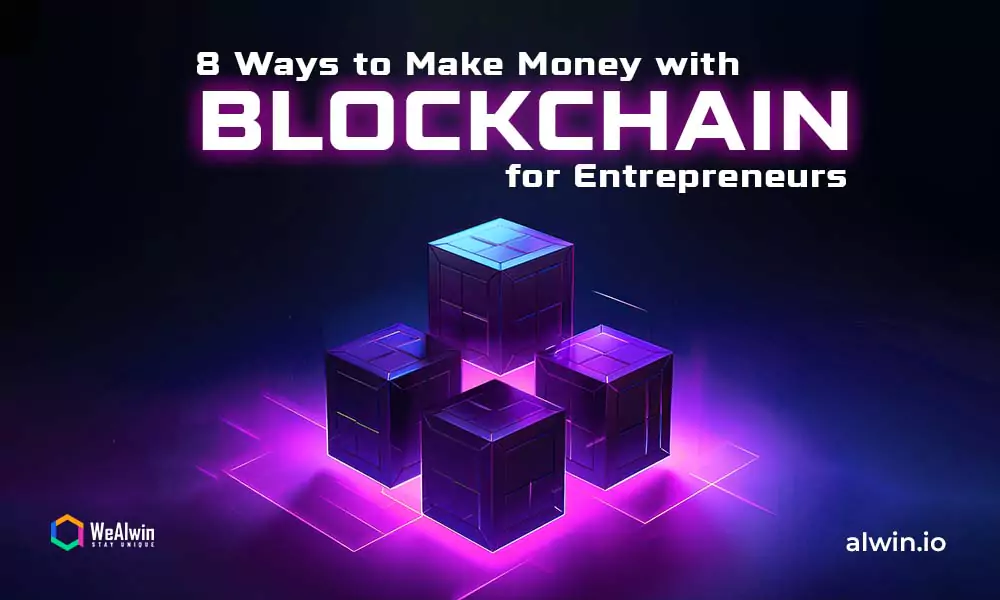Blockchain technology has emerged as a transformative force across various industries, reshaping how businesses operate and interact with their customers.
Its decentralized nature and ability to provide secure, transparent transactions have made it a cornerstone for innovation in the digital age.
At its core, blockchain is a distributed ledger technology that records transactions across multiple computers in such a way that the registered transactions cannot be altered retroactively.
This functionality ensures data integrity and security, making it a preferred choice for applications requiring trust and transparency.
For solution-based businesses, the importance of blockchain cannot be overstated. It offers unique advantages such as enhanced security, reduced operational costs, and improved efficiency.
Entrepreneurs can leverage these benefits to create innovative solutions that address real-world problems, positioning their ventures for success in an increasingly competitive landscape.
8 Ways to Make Money with Blockchain for Entrepreneurs
1. Blockchain Development and Consulting Services
Blockchain Development
Blockchain development involves creating and deploying blockchain technology to meet the unique requirements of different businesses.
Entrepreneurs can offer various blockchain solutions, including:
- Public Blockchains
- Private Blockchains
- Consortium Blockchains
The development process entails several critical steps:
- Identify Use Cases
- Design the Architecture
- Develop Smart Contracts
- Implement Security Measures
- Launch and Monitor
The market demand for blockchain solutions is rising as businesses seek to enhance transparency, security, and efficiency.
Industries such as finance, supply chain, healthcare, and real estate are increasingly adopting blockchain technology.
This trend presents significant business opportunities for entrepreneurs who can deliver tailored blockchain solutions that meet specific industry needs.
Blockchain Consulting
As businesses navigate the complexities of blockchain technology, consulting services have become invaluable.
Entrepreneurs can establish consulting firms that provide strategic advice on blockchain adoption and implementation.
Blockchain consultants guide organizations in understanding how to leverage the technology effectively.
This includes assessing current operations, identifying potential use cases, and developing a roadmap for implementation.
Consultants also help businesses navigate regulatory challenges and ensure compliance with industry standards.
Successful blockchain consultants typically possess a blend of technical expertise and business acumen.
Key skills include:
- Technical Knowledge
- Business Strategy
- Communication Skills
The value proposition lies in the consultants’ ability to accelerate blockchain adoption, reduce implementation risks, and maximize return on investment for their clients.
Numerous organizations have benefited from blockchain consulting services.
For instance, a logistics company reduced its supply chain costs by 30% through the implementation of a private blockchain that enhanced transparency and traceability.
Similarly, a financial institution improved its transaction processing speed and security by adopting a consortium blockchain, resulting in significant operational efficiencies.
These case studies highlight the tangible benefits of blockchain consulting, reinforcing the potential for entrepreneurs to carve out a niche in this dynamic field.
Schedule a Call with Our Experts to Get a Quote! Chat with us on WhatsApp
2. Creating Blockchain-Based Products or Services
Developing blockchain-based products or services can open up significant revenue streams for entrepreneurs. By leveraging the unique features of blockchain technology, entrepreneurs can create innovative solutions that address specific market needs.
Developing Blockchain-Based Solutions
Entrepreneurs can develop various blockchain-based products and services, such as:
- Writing Smart Contracts
- Decentralized Applications (DApps) Development
- Tokenized Assets
- Blockchain-as-a-Service (BaaS)
Key Considerations in Product Development
When developing blockchain-based products, entrepreneurs should consider:
- Scalability
- Security
- Usability
- Compliance
Go-to-Market Strategies
To successfully bring blockchain-based products to market, entrepreneurs should:
- Identify Target Audience
- Build Partnerships
- Create a Strong Brand
- Leverage Digital Marketing
Launching a Blockchain Start-Up
Starting a blockchain-based business requires careful planning and execution.
Key steps include:
- Business Planning and Funding: Develop a comprehensive business plan outlining the vision, target market, revenue model, and growth strategy. Seek funding from investors, venture capitalists, or through Initial Coin Offerings (ICOs).
- Identifying Market Needs and Opportunities: Conduct thorough market research to identify unmet needs and opportunities where blockchain can provide a unique solution.
- Building a Competent Team: Assemble a team with diverse skills in blockchain technology, business development, marketing, and legal compliance.
- Developing a Minimum Viable Product (MVP): Create a prototype or MVP to test the concept and gather feedback from early users.
- Launching and Scaling: Introduce the product to the market, gather user feedback, and iterate to improve the offering. Focus on scaling the business by expanding the customer base and entering new markets.
Tips for a Successful Blockchain Start-Up
- Keep up-to-date with the latest developments in blockchain technology and industry trends.
- Ensure your solution addresses real-world problems and provides tangible benefits to users.
- Implement robust security measures to build trust with users and protect against vulnerabilities.
- Stay flexible and be willing to pivot based on market feedback and changing conditions.
- Build relationships with other entrepreneurs, investors, and industry experts to gain insights and support.
By developing innovative blockchain-based products and services, entrepreneurs can create new revenue streams, drive technological advancement, and establish themselves as leaders in the blockchain space.
3. Participating in Initial Coin Offerings (ICOs) and Security Token Offerings (STOs)
What Are ICOs and STOs?
Initial Coin Offerings (ICOs) and Security Token Offerings (STOs) are fundraising mechanisms that leverage blockchain technology to raise capital for projects.
- ICOs (Initial Coin Offerings): ICOs involve the sale of new cryptocurrency tokens to raise capital. Investors receive tokens that may have utility within a project or can be traded on exchanges.
- STOs (Security Token Offerings): STOs involve the sale of tokenized securities. These tokens represent ownership in an asset, such as equity, real estate, or bonds, and are subject to regulatory oversight.
The primary distinction between ICOs and STOs lies in their regulatory frameworks and the nature of the tokens offered.
While ICOs are generally less regulated and can be seen as more speculative, STOs comply with securities laws, offering investors rights similar to traditional securities, such as dividends and voting rights.
This regulatory compliance enhances investor protection and market integrity.
How to Invest and Participate
Investing in ICOs and STOs requires a clear understanding of the process:
- Research Projects: Investigate the project’s whitepaper, team, and market potential to assess viability.
- Create a Digital Wallet: Set up a cryptocurrency wallet compatible with the tokens being offered.
- Purchase Tokens: For ICOs, buy tokens using cryptocurrencies like Bitcoin or Ethereum.
For STOs, ensure you meet any accreditation requirements before purchasing.
- Stay Updated: Follow project updates and community discussions to remain informed about developments and potential risks.
Evaluating ICO/STO Opportunities
When evaluating ICOs and STOs, consider the following factors:
- Team Credentials: Assess the experience and track record of the project team.
- Market Demand: Analyze the problem the project aims to solve and its potential market size.
- Regulatory Compliance: Check if the offering adheres to relevant regulations, particularly for STOs.
- Community Engagement: A strong, active community can indicate a project’s credibility and potential for success.
Potential Returns and Market Trends
- Growing Preference for STOs: Investors are increasingly seeking safer, more regulated investment opportunities. This trend is driven by concerns over the volatility and regulatory issues associated with ICOs.
- Shift Toward STOs: Current market developments show a shift towards STOs for more secure and regulated crowdfunding of startups. STOs provide investors with secured rights and address concerns about the ICO bubble.
- Lower Costs: STOs are expected to offer lower intermediary and transaction costs compared to traditional methods like IPOs.
However, the liquidity of STOs for SME financing is still uncertain, with most tokens held by accredited investors.
Key Factors for Success in ICOs and STOs
To succeed in participating in ICOs and STOs, consider these key factors:
- Due Diligence: Conduct thorough research on the project and its market potential.
- Regulatory Awareness: Stay informed about the regulatory landscape affecting ICOs and STOs to make compliant investment decisions.
- Risk Management: Diversify investments and only allocate funds you can afford to lose, particularly in the volatile ICO market.
- Community Involvement: Engage with the project’s community to gain insights and stay updated on developments.
By understanding the nuances of ICOs and STOs, potential investors can make informed decisions that align with their financial goals and risk tolerance.
4. Investing in Cryptocurrencies
Investing in cryptocurrencies requires a strategic approach that aligns with individual financial goals and risk tolerance. Investors can choose between long-term holding, known as "HODLing," and active trading to capitalize on market fluctuations.
Each method has its merits and can be tailored to fit different investment strategies.
Long-Term Investing vs. Trading
- Long-Term Investing: This strategy involves buying and holding cryptocurrencies for an extended period, betting on their appreciation over time. Investors often focus on established cryptocurrencies like Bitcoin and Ethereum, which have shown significant growth historically.
- Trading: Active trading involves buying and selling cryptocurrencies over shorter time frames to take advantage of price volatility. Traders often rely on technical analysis and market trends to make quick decisions, which can yield high returns but also carry higher risks.
Identifying Promising Cryptocurrencies
To identify promising cryptocurrencies, investors should consider the following factors:
- Market Capitalization
- Use Case and Technology
- Community and Development Activity
- Risk Management and Diversification
Risk management is crucial in cryptocurrency investing due to the market's inherent volatility.
Key strategies include:
- Diversification
- Setting Stop-Loss Orders
- Regular Portfolio Review
Case Studies of Successful Cryptocurrency Investments
- Bitcoin (BTC): Early investors in Bitcoin have seen astronomical returns. For instance, those who purchased Bitcoin in 2010 at around $0.08 and held until 2021, when it peaked at nearly $65,000, realized gains exceeding 81 million percent.
- Ethereum (ETH): Investors who bought Ethereum during its ICO in 2014 at $0.30 and held until its peak in 2021 at around $4,800 enjoyed returns of over 1,500 times their initial investment.
- Chainlink (LINK): Launched in 2017, Chainlink started at approximately $0.11. By 2021, it reached an all-time high of over $52, representing a return of nearly 47,000%.
Schedule a Call with Our Experts to Get a Quote! Chat with us on WhatsApp
5. Staking and Yield Farming
Staking Cryptocurrencies
Staking cryptocurrencies involves holding funds in a cryptocurrency wallet to support the operations of a blockchain network. By staking, users contribute to the security and efficiency of the network and are rewarded with additional cryptocurrency tokens.
How Staking Works?
Staking is primarily used in cryptocurrencies that employ the proof-of-stake (PoS) consensus mechanism. In PoS, validators are chosen to verify transactions and add new blocks to the blockchain based on the amount of cryptocurrency they hold. The more a user stakes, the higher their chances of being selected as a validator and earning rewards.
Benefits
- Earn passive income through staking rewards.
- Support the security and stability of the blockchain network.
- Participate in network governance through voting rights.
Risks
- Locked funds during the staking period, reducing liquidity.
- Potential slashing penalties if the validator misbehaves or goes offline.
- Market risk if the staked cryptocurrency's value decreases.
Best Practices for Investors
- Research the cryptocurrency's staking rewards and lock-up periods.
- Use reputable staking platforms or run your own validator node.
- Diversify your staked assets across multiple cryptocurrencies.
- Stay updated on network upgrades and potential slashing events.
Yield Farming
Yield farming, also known as liquidity mining, is a strategy that allows cryptocurrency owners to generate rewards by providing liquidity to decentralized exchanges (DEXs) and lending platforms.
How Does Yield Farming Work?
Yield farmers deposit their cryptocurrencies into liquidity pools, which are used to facilitate trades on DEXs. In return, they receive a share of the trading fees generated by the pool, as well as additional rewards in the form of the platform's native tokens.
Popular yield farming platforms include Uniswap, Compound, and Aave. These platforms offer a wide range of liquidity pools and lending opportunities, each with varying rewards and risks.
Risks
- Impermanent loss, where the value of the deposited assets diverges from the market price.
- Smart contract and platform risks, as vulnerabilities could lead to hacks or loss of funds.
- Concentration risk, as high rewards, may attract excessive liquidity to certain pools.
Returns
- Yield farming can generate high annual percentage yields (APYs), often in the triple digits.
- Rewards are paid in the platform's native tokens, which can increase in value over time.
Yield farming is a complex and high-risk strategy, and investors should thoroughly understand the risks before participating.
By carefully selecting platforms and diversifying their investments, investors can maximize their returns while managing the associated risks.
6. Participating in Decentralized Finance (DeFi)
Decentralized Finance (DeFi) refers to a broad ecosystem of financial applications built on blockchain technology, aiming to recreate and improve upon traditional financial systems in a decentralized manner.
DeFi operates without central intermediaries, allowing for more transparent, efficient, and accessible financial services.
What Is DeFi and How Does It Work?
DeFi leverages smart contracts on blockchain platforms like Ethereum to create financial instruments and services such as lending, borrowing, trading, and investing.
These smart contracts automate and enforce the terms of financial transactions, reducing the need for traditional intermediaries like banks.
Opportunities for Investors and Entrepreneurs
DeFi presents numerous opportunities for both investors and entrepreneurs:
- Investors: Can earn returns through activities such as lending assets, providing liquidity to decentralized exchanges, and participating in yield farming.
- Entrepreneurs: Can develop innovative financial products, create new decentralized applications (dApps), and offer unique financial services to the growing DeFi community.
Making Money with DeFi
Investors and entrepreneurs can capitalize on DeFi through various avenues:
- Lending and Borrowing
- Liquidity Provision
- Yield Farming
- Staking
- DeFi Tokens
Investment Strategies in DeFi
Effective DeFi investment strategies include:
- Diversification
- Research
- Risk Management
Benefits
- High Returns
- Transparency
- Accessibility
Risks
- Smart Contract Vulnerabilities
- Market Volatility
- Regulatory Uncertainty
Participating in DeFi offers significant potential for profit and innovation, but it requires a thorough understanding of the associated risks and rewards.
By adopting a strategic approach and staying informed about market developments, investors and entrepreneurs can effectively navigate the dynamic DeFi landscape.
7. Non-Fungible Tokens (NFTs)
Non-fungible tokens (NFTs) have transformed the digital landscape by offering a new way to establish ownership and authenticity. Unlike cryptocurrencies, which are fungible and interchangeable, NFTs are unique digital assets recorded on a blockchain.
Each NFT is distinct and cannot be replicated, making it valuable for collectors, creators, and investors. This uniqueness is what sets NFTs apart, offering a novel paradigm of digital ownership.
What Are NFTs and Their Use Cases
NFTs are cryptographic tokens that represent ownership of a unique asset on a blockchain.
Their applications extend beyond digital art to several other fields:
- Digital Art: Artists can tokenize their work, ensuring its authenticity and providing a direct sales channel to collectors.
- Collectibles: Platforms like NBA Top Shot enable users to buy, sell, and trade officially licensed digital trading cards.
- Gaming: NFTs can represent in-game assets, allowing players to own and trade items across different games.
- Real Estate: Physical properties can be tokenized, facilitating fractional ownership and smoother transactions.
- Event Tickets: NFTs can serve as tickets, reducing fraud and enhancing the ownership experience.
Opportunities for Investment and Revenue Generation
Investors and entrepreneurs can explore various avenues in the NFT market:
- Buying and Selling: Acquire NFTs at lower prices and sell them for a profit as their value appreciates with demand.
- Royalties: Creators can earn royalties from secondary sales, benefiting from the ongoing value of their work.
- Creating Unique Experiences: Brands can issue NFTs that grant exclusive access to events, products, or services, boosting customer engagement.
How to Create and Market NFTs
Creating NFTs is relatively straightforward and does not require extensive technical skills.
The process generally involves:
- Choosing a Blockchain: Most NFTs are created on Ethereum using standards like ERC-721 or ERC-1155, though blockchains like Solana and Polygon are also popular choices.
- Minting the NFT: Use platforms such as OpenSea, Rarible, or Mintable to upload your digital file and create the NFT. This process involves setting the token's properties and metadata.
- Marketing the NFT: Promote your NFT through social media, online communities, and NFT marketplaces to attract potential buyers. Engaging storytelling about the asset can enhance its appeal.
Best Practices for Success in the NFT Market
To thrive in the NFT space, consider the following best practices:
- Understand Your Audience
- Focus on Quality
- Leverage Community Engagement
- Stay Informed
- Be Transparent
By adopting these strategies, creators and investors can navigate the evolving NFT landscape, unlocking new opportunities for engagement and revenue generation.
Schedule a Call with Our Experts to Get a Quote! Chat with us on WhatsApp
8. Alternative Avenues
Micro-Task Platforms
Micro-task platforms offer a flexible way to earn cryptocurrency by completing small, straightforward online tasks. These tasks typically require minimal skills and include activities like data entry, surveys, and content moderation.
The key advantage of micro-tasking is its flexibility, allowing users to work at their own pace and select tasks that fit their schedules.
Examples and Earning Potential
- Amazon Mechanical Turk (MTurk): Connects requesters with workers for small tasks. Earnings vary widely based on task complexity and volume.
- Clickworker: Offers tasks such as writing, categorization, and proofreading. Workers can earn from a few cents to several dollars per task.
- Fiverr: While mainly a freelancing platform, it allows users to offer micro-services starting at $5, providing earnings based on specific skills or services.
Earnings on these platforms can range from a few extra dollars a week to more substantial amounts, depending on task selection and time invested.
Educational Incentive Programs
Learning and Earning with Blockchain Education Programs
Blockchain education programs combine learning with earning opportunities. These programs often use gamification to reward participants with tokens or other incentives for completing courses and milestones.
For example, platforms like BitDegree offer blockchain-based courses where students earn tokens for completing lessons and assessments.
This approach not only encourages learning but also helps participants gain valuable skills in the blockchain space.
Content Creation and Freelancing
Earning Through Blockchain-Focused Content Creation
Content creation is a growing field within the blockchain sector. Writers, designers, and video creators are in demand for producing educational content, marketing materials, and engaging with communities.
Steemit and Publish0x are platforms where writers can earn cryptocurrency for articles and blogs related to blockchain and cryptocurrency topics.
Freelance Opportunities in Blockchain
The freelance market for blockchain-related services is expanding. Key areas include:
- Blockchain Development: High demand for developers skilled in smart contracts, dApps, and blockchain infrastructure.
- Consulting: Experts offer services to businesses looking to adopt or integrate blockchain technology.
- Marketing and Community Management: Freelancers help build and engage communities for blockchain projects.
Platforms like Upwork and Freelancer list blockchain-related gigs, often commanding higher rates due to the specialized nature of the work.
By exploring these alternative avenues—micro-tasks, educational programs, and freelance opportunities—individuals can engage with the blockchain ecosystem, enhance their skills, and increase their earning potential.
Future Trends and Opportunities in Blockchain for Investors and Entrepreneurs
The blockchain landscape is evolving, with several trends poised to shape its future. Increased regulatory clarity is likely to boost investor confidence and attract institutional investment.
Advances in layer 2 solutions and cross-chain interoperability will enhance scalability and user experience.
Moreover, the fusion of blockchain with emerging technologies like artificial intelligence (AI) and the Internet of Things (IoT) promises to unlock new business models and applications.
Entrepreneurs who remain informed and adaptive to these trends will be in a prime position to leverage blockchain’s transformative potential.
Final Thoughts on Leveraging Blockchain Technology for Business Success
Blockchain technology represents a frontier of innovation, offering significant potential for business success.
Understanding its diverse applications and staying abreast of technological advancements will enable investors and entrepreneurs to harness its capabilities effectively.
Embracing blockchain technology can drive transparency, efficiency, and new value creation across various sectors.
By committing to ongoing learning and adaptability, you can position yourself to capitalize on blockchain opportunities and thrive in the evolving digital economy.
Ready to harness the power of blockchain technology for your business?
Partner with a leading blockchain development company like WeAlwin Technologies to explore customized solutions and unlock new possibilities.
Contact us today to start leveraging blockchain for your business success.



